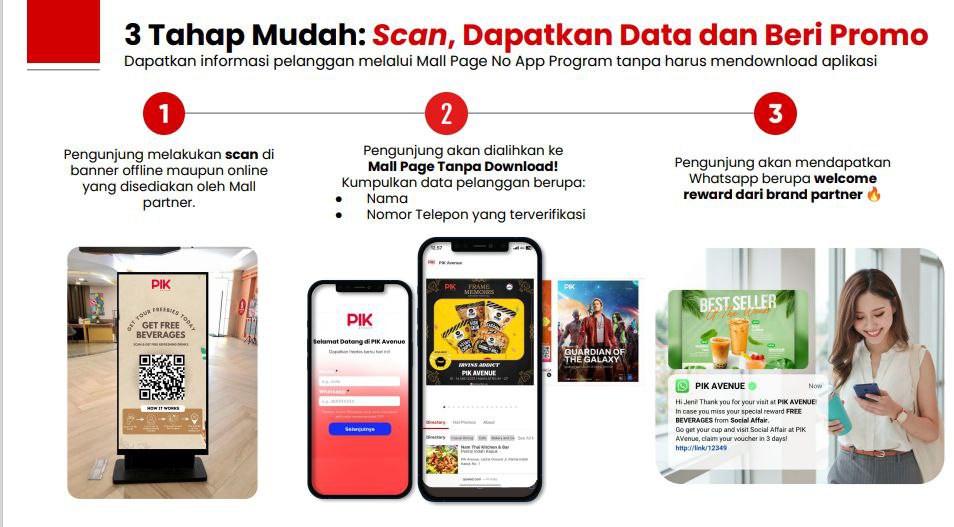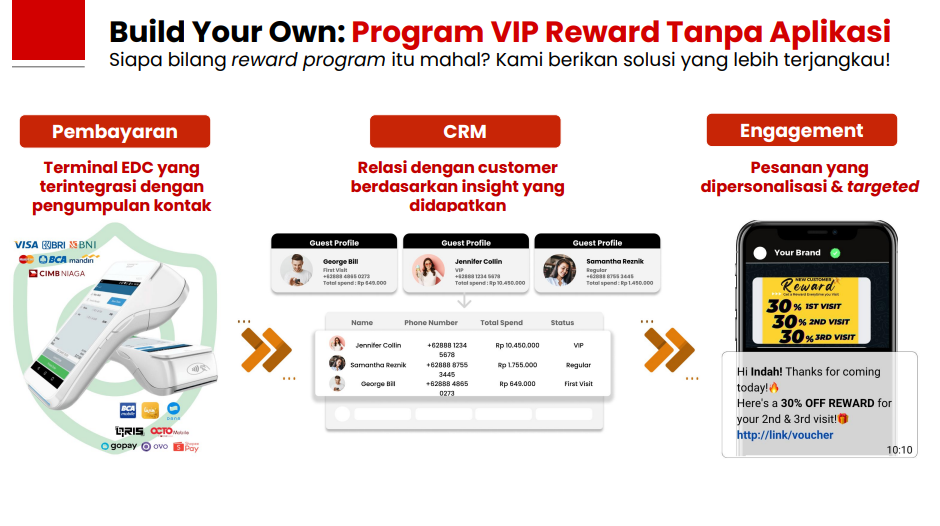Get to know the YOBO Retail Digitization Platform
Founded by Steven Kim (Co-Founder of Qraved) with Jaeyoun Doh (ex-CTO of itemku). Have obtained pre-initial investment from several investors
Activity offline re-emergence after the pandemic. After the retailer is "forced" to enter the platform online in order to reach consumers, now they can breathe easy again to activate their outlets to interact directly. Even so, many of these retailers still don't understand their consumers and how to attract them to visit outlets.
Steven Kim (CEO) and Jaeyoun Doh (CTO) caught this void by pioneering YOBO, trading and payment platforms (commerce and payment platforms) that leverage technology to collect data, provide a better consumer experience, and drive business growth. The solution is digital-based, does not require an application that must be downloaded by consumers or retailers.
"We help them take their business to online, get consumer data such as: who is the VIP customer? Who visits the most regularly? We process the data from the EDC that is already connected with reward to be given to consumers," explained YOBO Co-founder Steven Kim when met DailySocial.id.
YOBO, which stands for Your Own Business Online, was created by Kim with Doh and the team during the ongoing pandemic. YOBO product itself already live since mid-June 2023, it has been used by a number of retailers spread across malls throughout Jakarta.
Kim was previously the founder of Qraved, having held important positions at Rocket Internet SEA and Zalora. Meanwhile, Doh's previous company was My items were acquired by Bukalapak in May 2021.
YOBO Products
Kim explained that the YOBO product is a platform reward number based handphone at EDC. From the EDC machine used by the retailer, customer data will be collected when payment occurs. This data is processed to obtain insights that can be used to formulate the next promotional strategy.

Different from programs reward presented by retailers, consumers generally need to download the application reward and tell the cashier their customer number to collect points that you can redeem at a later date. However, this method is not necessarily successful because of the level churn tall one. Downloads will only be high when promotions occur. Not to mention the investment that businesses have to spend on developing applications and creating promotions is not cheap.
Therefore, the flow of consumers when transacting on tenant those who have used the YOBO solution are slightly different. The company works directly with the mall management, before inviting its tenants to adopt the YOBO solution.
Later in the mall there will be banners containing promotions from tenant, as well as a QR code that visitors can scan. When scanned, visitors will be taken to the mall's website and asked to enter their name and cellphone number before receiving other information sent via WhatsApp.
After success, consumers will automatically receive messages from WhatsApp, information about the mall directory, see ongoing sales and promotions, and events currently taking place at the mall.
"Because many visitors when they enter the mall don't know where they are going, what promotions they can receive, and benefits other. "So we are without an app, this new experience is good for visitors because all the information is sent to WhatsApp, where they open WhatsApp more often than other applications to get information."
DailySocial.id also took part in the experience when visiting Ashta, SCBD Jakarta. After scanning banner promotions that contain a QR code, there is a free drink promotion provided by Saturdays, one of the retailers that has partnered with YOBO.
Once you arrive at the outlet, the waiter tells you the requirements that must be met to exchange the promo, namely that you simply have to buy one of the food menus there. Saturdays' EDC machine will ask for the consumer's cellphone number before the QRIS code appears for payment.
"From the mall and tenant Now we have one new customer, who can be sent another message containing other promotions to invite that customer to come back."
Kim also ensured that visitor data security would not be shared with other parties, only mall managers and tenant only one can access it.

Not only the convenience above, YOBO will also provide businesses with CRM dashboard access to monitor consumer databases, as well as provide recommendations for appropriate promotions, accompanied by personalized and measurable messages.
"Many businesses want to have solutions for data management, customer management, business intelligence, project management, ads analysis. But this is all expensive because you have to recruit people, not to mention there is a risk that the results will not be worth it."
Monetization strategy
YOBO's approach is inspired by the success of Square, a startup from the United States. There, since Covid-19, the growth of payment business and business technology for the F&B and retail sectors has grown rapidly. Square itself is a payment company that provides POS products.
In contrast to Indonesia, POS players most sell their solutions on a subscription basis to utilize their engines and benefits other. As a result, there are fixed costs that retailers have to pay, while there is no guarantee that sales will remain high all the time.
"Meanwhile, many businesses have not thought about their promotional strategies, because so far players e-wallets, like Gopay which gives cashback. Meanwhile, now they no longer provide big promotions. How can they know who the VIP consumers are, benefits what it would take to come often, that's never thought of."
Therefore, the monetization taken by YOBO only comes from a service fee of 2,9% for every successful transaction that occurs in the tenant. These costs are considered more affordable than retailers having to adopt many solutions and recruiting new people.
Moreover, retailers do not have to use special EDC machines from YOBO, even though the company collaborates with one of the local POS players as the provider. The company chose to be agnostic, meaning the solution can connect with various POS providers, both digital (iSeller, Majoo, ESB, Moka) and conventional, such as Quinos, Raptor, and Micros.
"YOBO is a company with high money movement and always increases every month because it has economic units clear. All our income comes from every successful transaction. So tenants only pay us from successful transactions, without any fees upfront to subscribe to it."
Another agnostic side also applies to YOBO's target users, not only for the culinary business, but also from other verticals, namely fashion, Skincare, supermarkets, salons, gyms, to automotive.
The next plan
Kim confirmed that currently the company is still focusing on retailers offline by recruiting as many mall managers as possible to become users. It is targeted to add at least 50 more malls this year. Currently, the company is collaborating with Asri Group, the manager of Ashta mall, MOI, PIK Avenue, Hub Life and Grand Galaxy Park.
Next from the Pakuwon Group, which manages Kota Kasablanka and Gandaria City, and the Lippo Group, which manages Spark Senayan and Lippo Mall Puri. The plan is that other malls managed by this large group will be captured so that YOBO can operate throughout Indonesia.
Several retailers that have utilized the YOBO solution include Boga Group, Saturdays, Goobne, Social Affair, Baker Man, Xi Bo Ba, and many more.
To realize this plan, YOBO is currently raising initial funding. Currently, YOBO has received pre-initial funding from a number of investors and angel investors, one of them DS/X Ventures.
"We are looking for strategic investors who are strong in experience and have a strong network in the retail world offline to align with our current business."
Kim also opened up the possibility of targeting MSME retailers. Although the time cannot be determined yet, according to him the potential offered by this business segment is also promising. This segment generally has different challenges because most of them are still focused on increasing business, not yet on consumer retention.
"So with the approach top down, when this is successful, the mindset of SMEs will change. If they see that a large group like Boga Group is already using it, then they will be influenced."
The future of Qraved
More Coverage:
Regarding Qraved, Kim said that the pandemic "successfully" hit Qraved's business as a culinary directory platform because its monetization relies on advertising by business people. It's not only Qraved who is having difficulties, in fact Zomato closes its business in Indonesia.
However, this doesn't mean that platforms like this are no longer relevant with the latest developments, they are just more difficult to survive because most businesses don't have an excess marketing budget.
Currently, the startup is on hiatus (Paused), doesn't mean it will close. Because most of the resources are directed towards YOBO development, with the current team numbering around 15 people. However, he cannot yet confirm when at least Qraved can be revived.
"Maybe in the fourth quarter or next year, we will definitely revive it. To be honest, we don't know yet whether it will remain as it is discovery platform or not. What we have seen so far is that we have received a lot of requests from consumers about when it will be Update, because currently it is the last option for discovery "The food is only from Google Maps, while Zomato is closed here."
For the record, Qraved has been operating since 2013. At that time, its biggest competitors were Zomato and local player, GoingKuliner. Similar to Qraved, Zomato also arrived in Indonesia in 2013.
-
Disclosure: DS/X Ventures is part of the DailySocial.id group
Sign up for our
newsletter
 Premium
Premium
